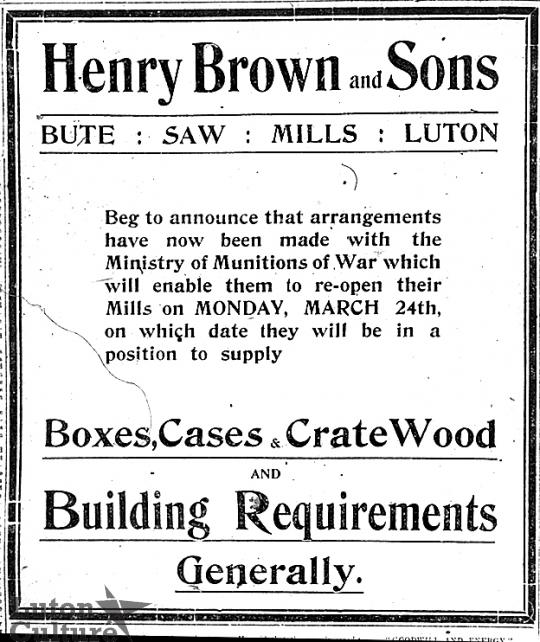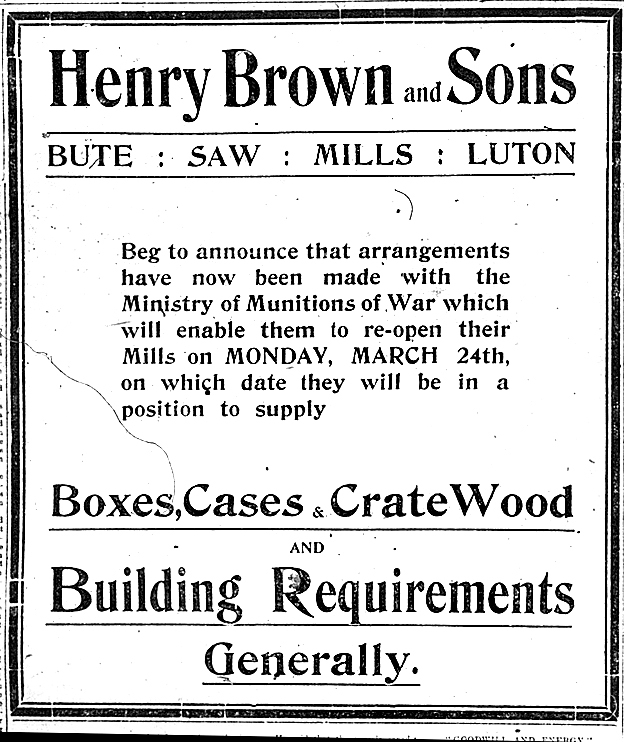Timber firm returns to civilian control

The century-old Luton timber firm of Henry Brown & Sons returned to private ownership on March 22nd, 1919, after the business had been commandeered by the Ministry of Munitions during the war. The Beds & Herts Saturday Telegraph (March 15th) reported:
Luton and district builders and hat exporters who have so long been clients of Messrs Henry Brown & Sons, timber merchants, Dunstable Road, will learn with satisfaction that their needs can soon be met by the old established firm. As announced in our advertisement columns today, the firm will re-enter possession of the undertaking as from March 22nd.
It will be interesting to outline the war history of the firm. In the early days of the war the firm was very busy producing material for munition works, and their ordinary business as builders' merchants and producers of hat crates, and turnery and joinery, gradually ceased.
Then came a drastic change when the Ministry of Munitions commandeered the staff, premises, machinery and offices. It did not merely assume control, but took the whole undertaking over, and the firm temporarily ceased to exist.
The mills were managed in every detail by the Ministry, this depot being one of 13 mills in England and others in Scotland commandeered. Unlike the rest it was not a derelict, practically ready to close down, but was a real live business ready to hand.
During the war it rendered invaluable service directly to our forces, owing to the initiative of the directors in installing several important additions to the mills, and due in no small measure to the managerial work of Mr Gregory and later Mr Andrews.
Before the change Messrs Henry Brown & Sons had at their own expense installed a steel gantry 30 feet high and 300 feet long upon which runs and electric crane capable of lifting a weight of ten tons. The gantry runs over the Great Northern Railway siding, and a truckload of timber can be unloaded in one operation. The electric crane supplies a very powerful bandmill saw for cutting up trees from a diameter of five feet.
The gantry and crane with the bandmill saw and with other war purposes machinery were erected by the firm at a cost of £10,000. About the same time a rack bench saw was put down on which logs and trees as long as 30 feet with a 48 inch diameter could be cut up. That machinery has been working day and night by electricity.
Early in 1916 the firm, owing to shipping and transport difficulties, instituted an entirely new tree felling and hauling department for the Government, and this Mr Arthur Brown was given charge of. All the timber has been converted from home grown trees, and one particular tree cost £20 for haulage only, and was four days on the journey from the woods to the yard. It weighed close upon seven tons.
During 1918 the mills dealt with a huge quantity of timber worth £70,000. Although engaged only in this branch, Mr Arthur Brown at all times gave ready assistance to the Ministry in the mills.
In regard to the felling of trees, the bulk of the home grown timber was taken to the mills from the Luton Hoo, Stockwood and Hyde estates, and in this connection the action of Lady Wernher and Mrs Francis Crawley rendered very patriotic help to the nation, for the money did not compensate for the loss of their beautiful trees.
It was absolutely essential to get wood of the highest quality and containing certain constituent features, and this was obtained from the surrounding estates.
Each mill taken over by the Government was given special work distinctive to the mill. The productions at Luton have been sent to all parts of the world, among these commodities being bozes, or what are known as Bethlehem shell cases. Thousands of hammer handles were also produced for all parts of the world.
From July last until the signing of the armistice the mills were able to supply Woolwich Arsenal with 75,000 ash felloes, which were made into wheels for the artillery. Woolwich at one time was at a standstill until the Luton mills gave the deliveries.
During the danger our troops were in at the time of the German offensive a year ago, the mills supplied huge sleepers to ensure a better utilisation of railway transport at and near the front.
When the Government commandeered the mills a special drying kiln was erected. It is 120 feet in length, 11 feet high and 30 feet wide, and in the kiln 130 tons of English timber can be dried in from two to three weeks, which process ordinarily takes from 18 months to two years.
Big stocks of timber will be left when the Ministry relinquishes the mills, and it is worthy of note that Messrs Henry Brown & Sons have bought the whole of the stocks, including round timber, kiln and air dried foreign imported, home grown and soft and hard woods.
The yards and storage sheds cover seven acres, with a 60-truck siding on the Great Northern and LNWR lines. The firm can undertake all those branches of work for which they were so well known before the war.
Subsequent to the armistice it was arranged with the Ministry of Munitions that the mills should revert back to the firm on May 1st, the intention of the Ministry being to close them down at the end of March. Messrs Brown & Sons, realising that this would involved the unemployment of a large staff of men for a month, made arrangements to resume occupation on March 31st. Now they have found it necessary, again to avoid unemployment of heir men, to resume occupation on the 22nd instant, for the orders of the Ministry to c lose down the mills were received by Mr Andrews only on Thursday of this week.
The short notice finds the proprietors at a great disadvantage as, owing to the sudden change of date, they have not sufficient time in which to obtain orders for so large a staff, and had circularised old customers to the effect that March 31st would be the re-opening day. They have had little opportunity to re-organise the staff after dispersal by the Ministry, and therefore all orders received by March 22nd will be very acceptable for the sake of preventing unemployment.
The directors hope to receive the renewed support of their old customers, which has been so generously extended in the past, and particularly at once all the local industries industries interested in the use of of timber and that of local builders and hat exporters.
The firm has always dealt in hard woods, foreign and English, as well as boxes and cases used in the straw trade for home and export purposes. They can supply the requirements for building the cottage or palace.
A firm with this record is confident of ready support now that peace is with us again.
Author: Deejaya



Add comment